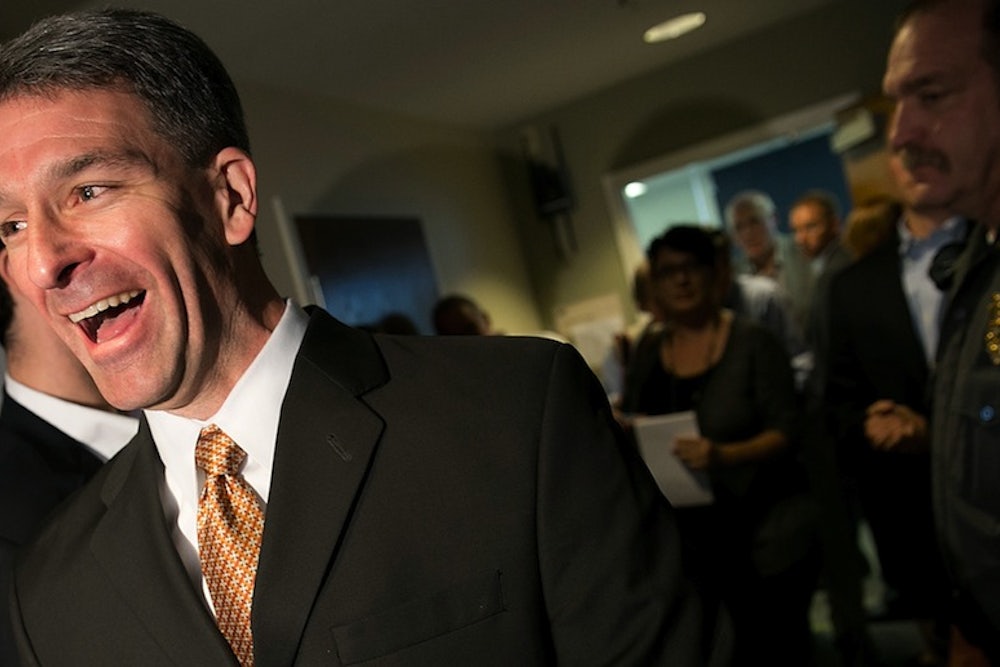Terry McAuliffe, the Democratic candidate for Virginia governor, isn’t popular. Worse still, he’s running in an off year election when young and non-white turnout will be low, which should make it difficult for McAuliffe to reassemble the “Obama coalition.” But according to last night’s surveys from NBC/Marist and the Washington Post, Terry McAuliffe has a clear lead of 5 and 8 points among likely voters over Republican candidate Ken Cuccinelli. The reason is simple: Ken Cuccinelli is prohibitively unpopular.
According to the NBC/Marist poll, Cuccinelli’s favorability rating is far underwater, at minus-14 points, with only 34 percent having a favorable impression and 47 percent unfavorable. The Washington Post has similar numbers: 43 percent favorable, 52 percent unfavorable. And while Terry McAuliffe isn’t Mr. Popular, Cuccinelli makes McAuliffe look like a decent candidate: McAuliffe is at plus-7 in NBC/Marist and plus-9 in the Washington Post survey. Looking through the Washington Post survey, it’s hard to find any good news for Cuccinelli. He trails on the issues. He trails on character traits. 47 percent of likely voters think he’s “too conservative.”
It’s hard not to infer that cultural issues are at the heart of Cuccinelli’s problem. For months, the McAuliffe campaign has aired advertisements attacking cultural issues, including an advertisement suggesting that Cuccinelli supports limiting a woman’s right to divorce. And perhaps as a result, McAuliffe has a huge advantage among women: 18 points in the NBC/Marist survey, 27 points in the Washington Post. Cuccinelli leads among men in both surveys, but not by nearly enough to overwhelm McAuliffe’s massive edge among women.
Cuccinelli’s advantage was supposed to be McAuliffe’s slimy persona, insider history, and sketchy business deals. But voters are paying closer attention to the Star Scientific scandal, where a Virginia company gave gifts to Republican lawmakers, than McAuliffe’s dealings at GreenTech, a company under federal investigation that McAuliffe once led. And perhaps as a result, 37 percent of likely voters don’t think Cuccinelli has high personal moral and ethical standards, compared to 33 percent who harbor similar doubts about McAuliffe.
Making matters worse for Cuccinelli is Libertarian candidate Robert Sarvis. He’s capitalizing on disaffection with the major party candidates, and the polls show him attracting nearly 10 percent of the vote. The good news for Cuccinelli is that Sarvis is unlikely to finish with 10 percent, since polls tend to overstate the final support of third-party candidates. The bad news is that McAuliffe still leads by 5 points in a two-way race, with 49 percent of the vote.
Virginia gubernatorial contests can shift over the last month. At this time eight years ago, for instance, the most recent surveys showed Tim Kaine trailing by 1 to 7 points. No poll showed a Kaine lead until October 16, even though Kaine would ultimately go win by 6 points. So Terry MacAuliffe’s modest lead in the polls isn’t necessarily ironclad. There are still several debates and plenty of advertisements left to air.
But so far, Ken Cuccinelli has made a decidedly negative impression on Virginia’s voters. And the McAuliffe campaign has a big financial advantage, so they’ll probably maintain a favorable balance on the airwaves. Unless Virginians see a far different Cuccinelli over the next month, there’s not much reason to expect voters will change their minds about his candidacy. Cuccinnelli’s chances, then, seem to rest on the possibility of a McAuliffe implosion. That’s certainly possible—McAuliffe is a novice candidate with an unflattering past—but it hasn’t happened yet, and there’s only a month to go.
Correction: A previous version of this article misspelled Ken Cuccinelli's last name.
